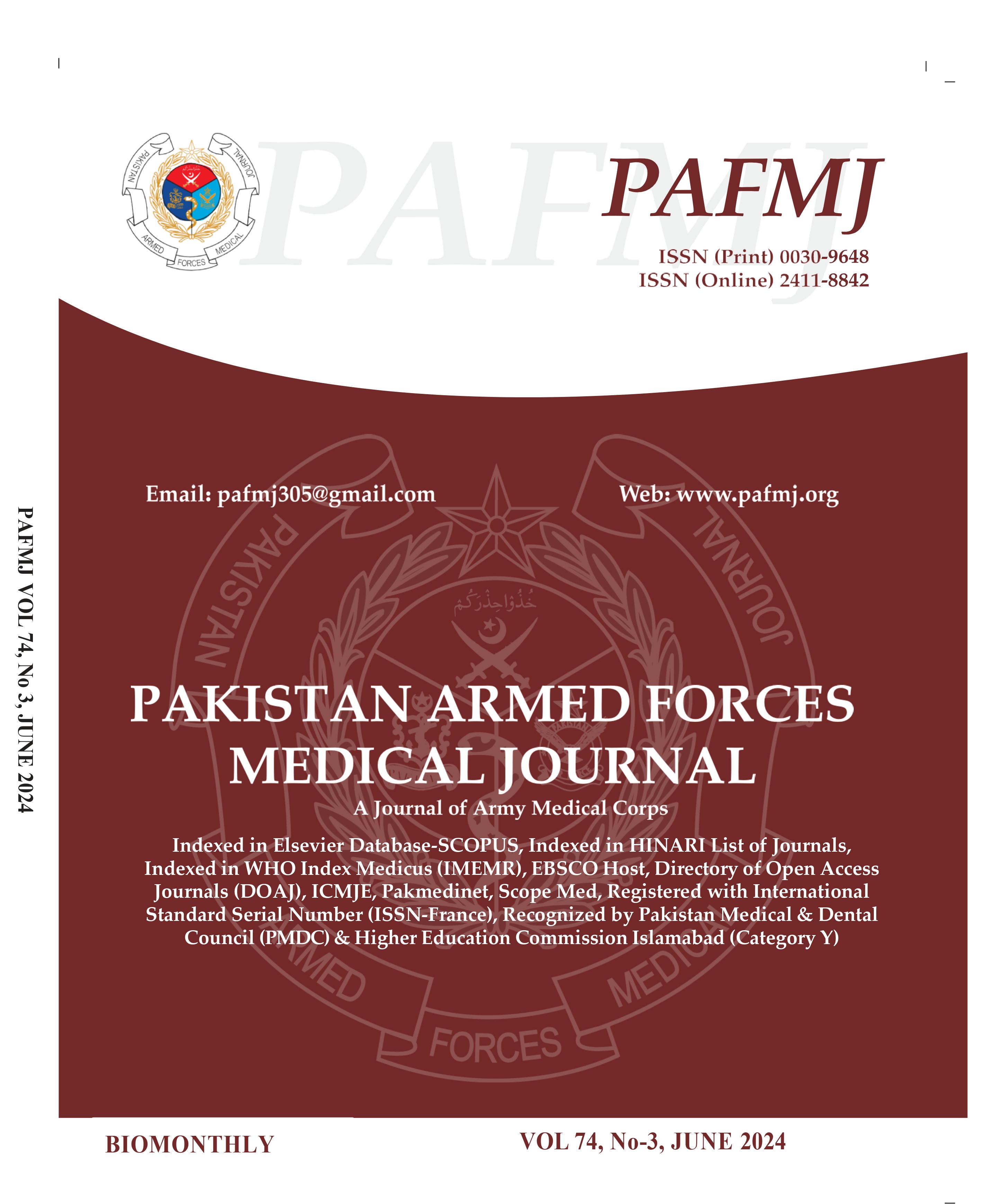Short-Term Outcome of Tetralogy of Fallot Repair: A Single Center Experience in A Developing Country
DOI:
https://doi.org/10.51253/pafmj.v74i3.8796Keywords:
Aorta, Mortality, Tetralogy of fallotAbstract
Objective: To note short-term outcome of patients undergoing tetralogy of fallot repair.
Study Design: Retrospective longitudinal study.
Place and Duration of Study: Department of Pediatric Cardiology, National Institute of Cardiovascular Disease, Karachi Pakistan, from Sep 2020 to Feb 2021.
Methodology: A total of 113 patients under 25 years of age who underwent tetralogy of fallot correction were included. Pre-operative information, echocardiography, investigations and history of the patient were noted. Intra-operative and post-operative information and surgical procedure were also noted. Short-term outcome included data up to discharge or death of the patients enrolled.
Results: Mean age was noted to be 9.40+5.01 years, with 59(52.2%) of the patients undergoing tetralogy of fallot repair were male. Mean saturation of peripheral Oxygen (SpO2) at the time of surgery was noted to be 79.27±.34. There were 76(67.3%) patients without history of previous surgery. Mean cardiopulmonary bypass time was noted to be 106.04±40.59 minutes. Mean aortic cross-clamp time was recorded to be 58.79±27.90 minutes. Additional procedures were required in 68(60.2%) patients. Mean duration of hospital stay was 13.96±8.68 days while mean duration of ICU stay was 87.04±69.37 hours. Mortality was reported in 3(2.7%) patients.
Conclusion: Low mortality and low post-operative morbidity were noted among patients undergoing tetralogy of fallot repair.
Downloads
References
Sánchez Ramírez CJ, Pérez de Isla L. Tetralogy of Fallot: cardiac imaging evaluation. Ann Transl Med 2020; 8(15): 966.
https://doi.org/10.21037/atm.2020.02.18
Asghar RM. Frequency of Congenital Heart Diseases at Benazir Bhutto Hospital Rawalpindi. Ann Pak Inst Med Sci 2010; 6(2): 120-123.
Norgard G, Gatzoulis MA, Moraes F, Lincoln C, Shore DF, Shinebourne EA, et al. Relationship between type of outflow tract repair and postoperative right ventricular diastolic physiology in tetralogy of Fallot. Implications for long-term outcome. Circulation 1996; 94(12): 3276-3280.
https://doi.org/10.1161/01.cir.94.12.3276
Cullen S, Shore D, Redington A. Characterization of right ventricular diastolic performance after complete repair of tetralogy of Fallot: restrictive physiology predicts slow postoperative recovery. Circulation 1995; 91(6): 1782-1789.
https://doi.or/10.1161/01.CIR.91.6.1782
Waqar T, Riaz MU, Mahar T. Tetralogy of Fallot repair in patients presenting after Infancy: A single surgeon experience. Pak J Med Sci 2017; 33(4): 984-987.
https://doi.og/10.12669/pjms.334.12891
Dragulescu A, Friedberg MK, Grosse-Wortmann L, Redington A, Mertens L. Effect of chronic right ventricular volume overload on ventricular interaction in patients after tetralogy of Fallot repair. J Am Soc Echocardiogr 2014; 27(8): 896-902.
https://doi.org/10.1016/j.echo.2014.04.012
Wise-Faberowski L, Asija R, McElhinney DB. Tetralogy of Fallot: Everything you wanted to know but were afraid to ask. Paediatr Anaesth 2019; 29(5): 475-482. https://doi.org/10.1111/pan.13569
Sachdev MS, Bhagyavathy A, Varghese R, Coelho R, Kumar RS. Right ventricular diastolic function after repair of tetralogy of Fallot. Pediatr Cardiol 2006 Mar-Apr; 27(2): 250-255.
https://doi.org/10.1007/s00246-005-1186-y
Rathore KS, Gupta N, Kapoor A, Modi N, Singh PK, Tewari P, et al. Assessment of right ventricular diastolic function: does it predict post-operative course in tetralogy of Fallot. Indian Heart J 2004; 56(3): 220-224.
Harris AM, Segel N, Bishop JM. Blalock-Taussig anastomosis for tetralogy of fallot. A ten-to-fifteen year follow-up. Br Heart J 1964; 26(2): 266-267.
https://doi.org/10.1136/hrt.26.2.266
Di Donato RM, Jonas RA, Lang P, Rome JJ, Mayer JE Jr, Castaneda AR. Neonatal repair of tetralogy of Fallot with and without pulmonary atresia. J Thorac Cardiovasc Surg 1991; 101: 126-137.
Reddy VM, Liddicoat JR, McElhinney DB, Brook MM, Stanger P, Hanley FL. Routine primary repair of tetralogy of Fallot in neonates and infants less than three months of age. Ann Thorac Surg 1995; 60(6 Suppl): 592-596.
https://doi.org/10.1016/0003-4975(95)00732-6
Touati GD, Vouhe PR, Amodeo A. Primary repair of tetralogy of Fallot in infancy. J Thorac Cardiovasc Surg 1990; 99: 396-402.
Knott-Craig CJ, Elkins RC, Lane MM, Holz J, McCue C, Ward KE. A 26-year experience with surgical management of tetralogy of Fallot: risk analysis for mortality or late reintervention. Ann Thorac Surg 1998; 66: 506-511.
https://doi.org/10.5090/kjtcs.2012.45.4.213
Khan I, Tufail Z, Afridi S, Iqbal M, Khan T, Waheed A. Surgery for Tetralogy of Fallot in Adults: Early Outcomes. Brazilian J Cardiovasc Surg 2016; 31(4): 300–303.
https://doi.org:10.5935/1678-9741.20160063
Andreasen JB, Johnsen SP, Ravn HB. Junctional ectopic tachycardia after surgery for congenital heart disease in children. Intensive Care Med 2008; 34: 895-902.
https://doi.org/10.1007/s00134-007-0987-2
Batra AS, Chun DS, Johnson TR. A prospective analysis of the incidence and risk factors associated with junctional ectopic tachycardia following surgery for congenital heart disease. Pediatr Cardiol 2006; 27: 51-55.
https://doi.org/10.1007/s00246-005-0992-6
Egbe AC, Nguyen K, Mittnacht Aj, Joashi U. Predictors of intensive care unit morbidity and midterm follow-up after primary repair of tetralogy of fallot. Korean J Thorac Cardiovasc Surg 2014; 47: 211-219.
https://doi.org/10.5090/kjtcs.2014.47.3.211
Hirsch JC, Mosca RS, Bove EL. Complete repair of tetralogy of Fallot in the neonate: results in the modern era. Ann Surg 2000; 232(4): 508-514.
https://doi.org/10.1097/00000658-200010000-00006
Kolcz J, Pizarro C. Neonatal repair of tetralogy of Fallot results in improved pulmonary artery development without increased need for reintervention. Eur J Cardiothorac Surg 2005; 28(3): 394-399. https://doi.org/10.1016/j.ejcts.2005.05.014
Van Dongen EI, Glansdorp AG, Mildner RJ. The influence of perioperative factors on outcomes in children aged less than 18 months after repair of tetralogy of Fallot. J Thorac Cardiovasc Surg 2003; 126(3): 703-710.
https://doi.org/10.1016/s0022-5223(03)00035-7
Van Arsdell GS, Maharaj GS, Tom J. What is the optimal age for repair of tetralogy of Fallot? Circulation 2000; 102(3): 23-29.
Downloads
Published
Issue
Section
License
Copyright (c) 2024 Aliya Kemal Ahsan, Rumana Sangi, Abdul Sattar Shaikh, Rajab Ali Khokhar, Mujeeb ur Rehman, Sohail Khan Bangash, Saad Bader Zaki, Najma Patel

This work is licensed under a Creative Commons Attribution-NonCommercial 4.0 International License.















